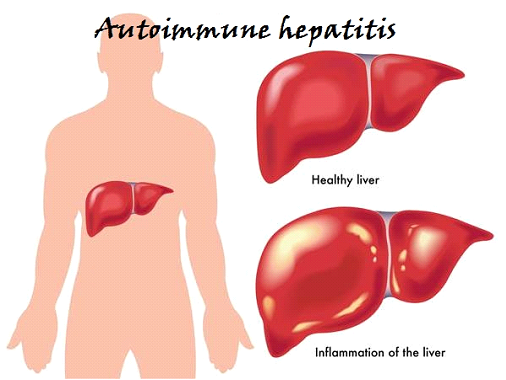Autoimmune Hepatitis Symptoms, Causes, Diagnosis and Treatment

What Is An Autoimmune Hepatitis?
It is the inflammation that occurs in the liver. As the name suggests, it is an autoimmune disease wherein liver inflammation arises when the immune system of the body attacks the liver erroneously. Even though, what triggers the disease is not completely known, however certain diseases, drugs and toxins may possibly source autoimmune hepatitis, especially in people with a higher risk, example women.
Without any treatment, the disease can lead to cirrhosis– that is the scarring of liver, followed by liver failure ultimately. If autoimmune hepatitis is diagnosed at an initial stage and one pursues its treatment on immediate basis; then chances of its management increases with the drugs prescribed for suppressing the immune system.
If the disease has reached its advance stage or has failed to respond the drug treatments, doctor can suggest the option of liver transplant.
What Are The Symptoms Of Autoimmune Hepatitis?
Few common symptoms of autoimmune hepatitis are:
- Clay or pale-colored stools.
- Nausea.
- Vomiting.
- Loss of appetite.
- Itching.
- Malaise.
- Fatigue.
- Dark urine.
- Absence of menstruation.
- Abdominal distention.
When Is The High Time To Seek Medical Assistance?
Do not delay to call up for an appointment in case you notice the above mentioned symptoms of autoimmune hepatitis.
What Causes The Autoimmune Hepatitis?
Autoimmune hepatitis, as the name suggests, is an autoimmune disease, wherein the immune system of a body turns against the body itself. It becomes unable to distinguish the healthy body tissues, considering them as harmful substances. It then attacks and destroys them.
In autoimmune hepatitis, immune system attacks your liver. This result in
- Great damage to the liver cells.
- Chronic inflammation in the liver.
Though, what turns the immune system of a body to turn against itself is unknown till date, yet it is believed that autoimmune hepatitis occurs due to the interfacing between the following risk factors:
- Genetic predisposition.
- Medication.
- Infection.
What Are The Risk Factors Of Autoimmune Hepatitis?
Few factors identified for raising the risks of autoimmune hepatitis are:
- Being a female.
- Young adults, especially females.
- History of some infections.
- Certain medications.
- Hereditary.
- Having an autoimmune disease.
What Are The Potential Complications Of Autoimmune Hepatitis?
Few complications associated with autoimmune hepatitis are:
- Liver failure.
- Cirrhosis.
- Side effects from the medicines.
- Hepatocellular carcinoma.
How Is Autoimmune Hepatitis Diagnosed?
Few tests that can help diagnose autoimmune hepatitis are:
- Liver biopsy.
- Liver function tests.
- Serum IgG.
- Anti-smooth muscle sntibody.
- Anti-nuclear antibody.
- Anti LKM-1.
How Is Autoimmune Hepatitis Treated?
The doctor can suggest prednisone or some other corticosteroid drugs in order to reduce the liver inflammation. 6-mercaptopurine and Azathioprine are the drugs that are used to manage other autoimmune disorder; however the drugs have proven to relieve the symptoms of autoimmune hepatitis too.
For the instances that have failed to respond the treatments of drug, the doctor can suggest the option of liver transplant.
By : Natural Health News




